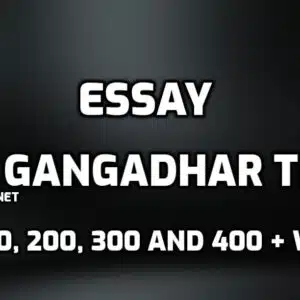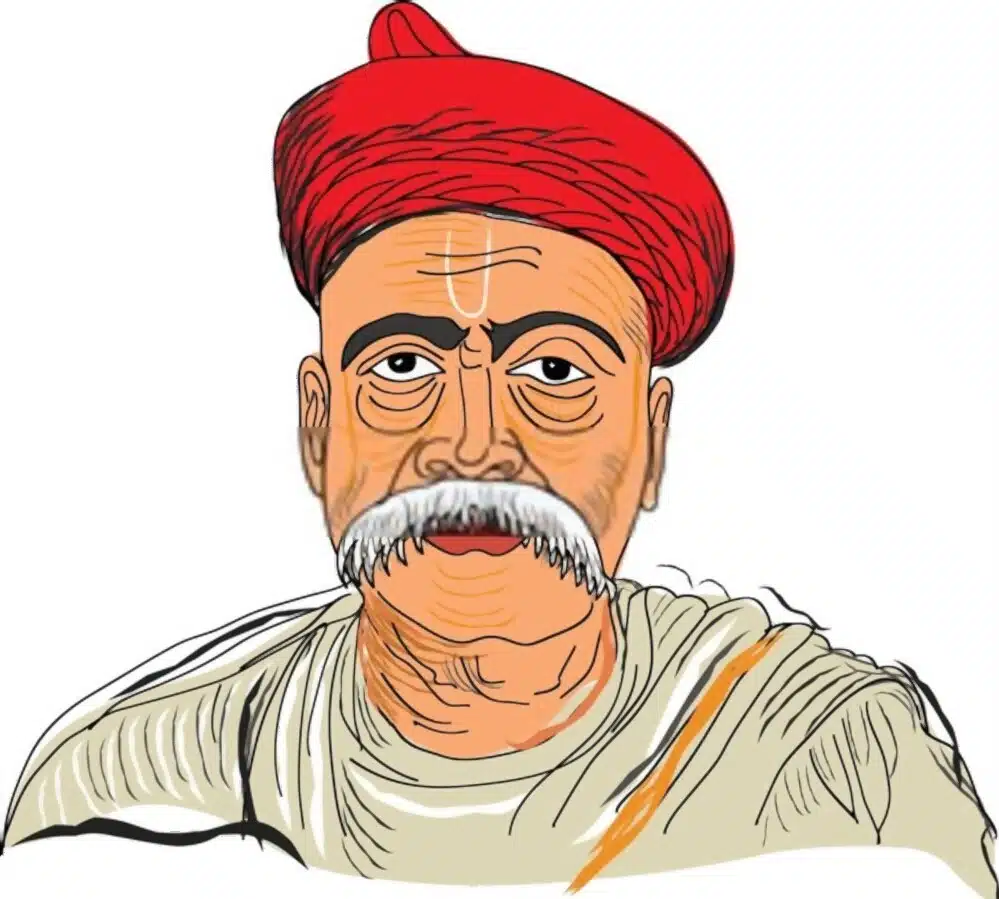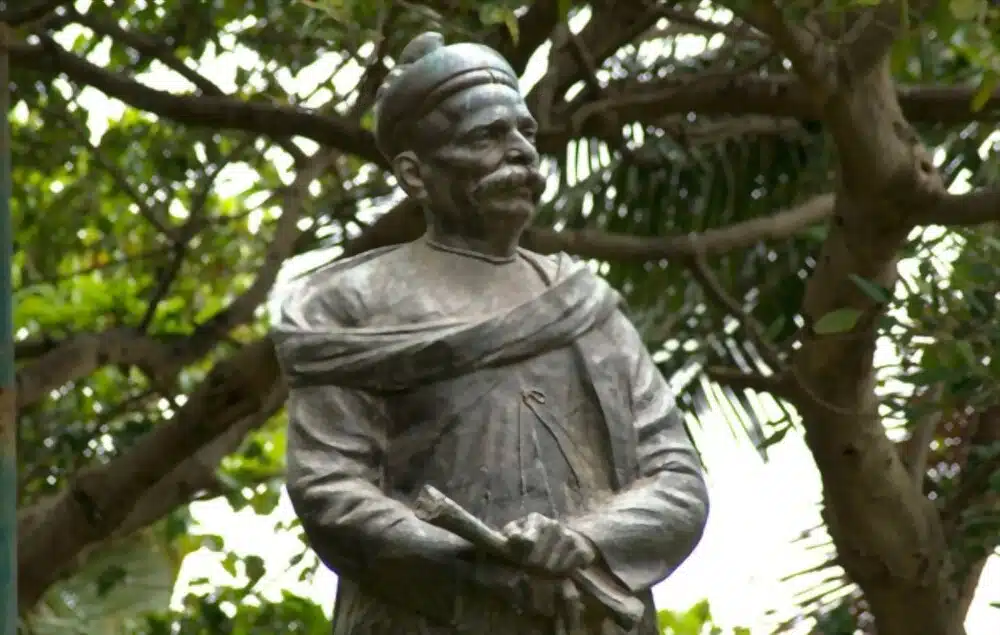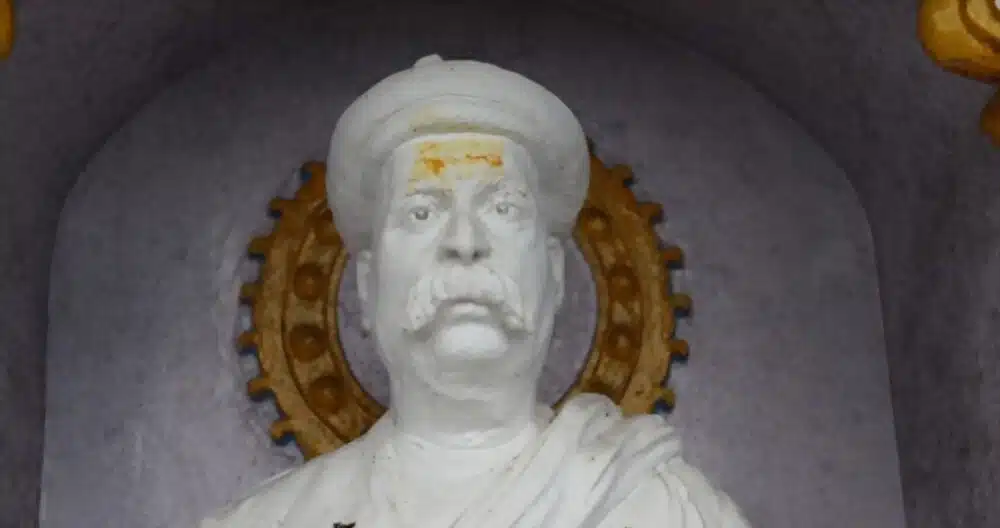
Essay on Bal Gangadhar Tilak in English for Classes 2, 3 and 4- 100 Words
Bal Gangadhar Tilak, also known as “Lokmanya Tilak,” was a great Indian nationalist leader. He played a huge role in India’s struggle for independence against British rule. He was born on July 23, 1856, in Ratnagiri district of Maharashtra. Tilak had a great intelligence. He contributed significantly to Indian politics through his writings and speeches. His famous slogan “Swaraj is my birthright, and I shall have it” inspired the people to fight for their country’s freedom. Tilak was a social reformer and worked tirelessly towards educating the people. The establishment of Deccan Education Society by him helped in spreading education among Indians during British rule.
Also Read:
- Essay on Lohri Festival in English
- Essay on Quami Ekta Week in English
- Essay on Why are Books Important in Our Life
- 5 Amazing Essays on Pet Animals
- Powerful Essay on Animals in English

10 Lines on Bal Gangadhar Tilak in English
- Bal Gangadhar Tilak was an Indian nationalist and social advocate of the early 20th century.
- He was born on 23rd July 1856 in Ratnagiri, Maharashtra, India.
- Tilak played a key role in the Indian independence movement and was one of the founders of the Indian National Congress.
- He was a strong advocate of Swaraj or self-rule and simplified the slogan “Swaraj is my birthright and I shall have it.”
- Tilak was a great writer and editor, and his newspapers Kesari and Maratha were widely read and powerful.
- He was also a champion of Indian culture and traditions, and founded the Ganesh Utsav festival to promote Hindu unity and pride.
- Tilak’s fight against British rule resulted in several arrests and jailed over his life.
- He died on 1st August 1920, and his funeral was attended by thousands of people.
- Tilak’s life as a nationalist leader and social advocate continues to inspire Indians today.
- He is remembered as a fearless and charming leader who dedicated his life to the cause of Indian independence.

Essay on Bal Gangadhar Tilak in English- 150 Words
Bal Gangadhar Tilak was one of the most well-known leaders in the Indian independence movement. He is known for his inspiring leadership, true patriotism, and unshaken commitment to India’s freedom struggle. Tilak played an important role in organizing people through his powerful speeches and writings. He highlighted the importance of self-rule. He also inspired millions of Indians to join against British colonialism.
Apart from being a political leader, he was also a social reformer. Tilak worked tirelessly towards educating people and promoting gender equality. His contributions towards education are evident by his establishment of Deccan Education Society. This society aimed at providing educational opportunities to all sections of society irrespective of caste or creed. His famous quote “Swaraj is my birthright, and I shall have it” still resonates with many Indians today as they struggle for true independence and sovereignty.
In conclusion, Tilak’s legacy has left a memorable mark on Indian history. His courage, vision, and fighting spirit continue to inspire generations even today.
Essay on Bal Gangadhar Tilak for Classes 5 and 6 – 250 Words
Bal Gangadhar Tilak is the one most prominent figures in the Indian history. He is known for his contributions to the Indian independence movement. Tilak was an advocate for Swaraj or self-rule. He believed that Indians should take charge of their own destiny. He started newspapers like Kesari and Maratha which were main aspects in spreading awareness about India’s struggle against British colonialism.
He simplified the slogan “Swaraj is my birthright and I shall have it.” This statement reflected among millions of Indians and became a symbol of their fight against British rule. Moreover, Tilak played a crucial role in organizing mass movements like the Ganesh Utsav and Shivaji festivals which brought people from different castes towards one common goal- freedom from colonial rule.
In conclusion, Bal Gangadhar Tilak will forever be remembered as a leader who inspired generations of Indians to stand up for their rights and try towards achieving liberation from foreign domination. Bal Gangadhar Tilak remains an iconic figure in modern Indian history whose contributions continue to inspire future generations. We should remember him as a hero who fought for liberty so that we can live with dignity today!

Essay on Bal Gangadhar Tilak for Classes 7 and 8- 300 Words
Introduction
Bal Gangadhar Tilak, popularly known as Lokmanya Tilak, was a great Indian nationalist leader who played a crucial role in the country’s struggle for freedom from British rule. He was not only an outstanding political figure but also a great scholar and writer who inspired millions of Indians to fight against injustice and oppression.
Bal Gangadhar Tilak’s Role in the Freedom Movement
Tilak played a significant role in promoting Hindu nationalism, emphasizing cultural unity among Hindus and advocating for their rights within India. He believed that Hinduism could provide the basis for building an independent nation, free from colonial oppression.
Despite being imprisoned several times by the British authorities, Tilak continued to fight tirelessly for India’s freedom until his death in 1920. Today, he remains an inspiration for many who seek social justice and equality in India.
Tilak believed that Swaraj or self-rule was necessary for India’s progress and worked towards achieving it. His famous quote “Swaraj is my birthright and I shall have it” became a rallying cry for many Indians fighting for independence.
He founded the Home Rule League in 1916 along with Annie Besant to demand self-government for India. He also supported the Non-Cooperation Movement launched by Mahatma Gandhi and helped people to boycott foreign goods and institutions.
Bal Gangadhar Tilak’s contributions towards India’s freedom struggle were immense, making him one of the most influential leaders in Indian history.
Death and Legacy
Bal Gangadhar Tilak passed away on August 1, 1920, at the age of 64. His death was a huge loss to the Indian Nationalist Movement and his followers across India.
Tilak’s legacy as a freedom fighter and social reformer continued long after his death. He played an important role in shaping the country’s political landscape and inspiring new generations of leaders to carry forward the fight for independence.
His famous slogan “Swaraj is my birthright” became a mantra for Indians fighting against British rule. Tilak also founded two newspapers – Kesari in Marathi and The Mahratta in English – which were huge platforms for spreading nationalist ideas among the people.
Tilak’s contribution towards education is also noteworthy. He emphasized free primary education for all children regardless of their caste or religion.
Today, Bal Gangadhar Tilak remains one of India’s most celebrated freedom fighters whose legacy continues to inspire future generations towards nation-building activities.
Conclusion
Bal Gangadhar Tilak was undoubtedly one of the most important figures in India’s freedom movement. He was a true son of India, who dedicated his life to the cause of Indian independence and worked tirelessly towards it until his last breath.
His immense contribution and sacrifice for India’s freedom will always be remembered and celebrated. Tilak’s role as an educator, journalist, social reformer, lawyer, politician, and above all as a nationalist leader is unparalleled.
Bal Gangadhar Tilak remains an iconic figure in modern Indian history whose contributions continue to inspire future generations. We should remember him as a hero who fought for liberty so that we can live with dignity today!
Essay on Bal Gangadhar Tilak in English for Senior Students- 400 + Words
Introduction
Bal Gangadhar Tilak, a name that resonates with India’s struggle for independence and the Hindu rebirth. He was one of the most impactful leaders in Indian history who dedicated his life to fighting for India’s freedom from British rule. His contribution to Indian politics and society has been monumental, inspiring generations of Indians towards self-rule and social reform.
His Early Life and Education
Bal Gangadhar Tilak was born on July 23, 1856 a small town in Maharashtra. His father was a school teacher who introduced him to a love of learning and education from an early age. At the age of ten, Tilak moved to Pune with his family where he continued his studies at the local English school.
Tilak’s want for knowledge led him to pursue higher education at Deccan College in Pune. He excelled academically and earned degrees in mathematics and law. However, it wasn’t just academics that interested Tilak; he also had an interest in Indian culture and history.
Despite facing financial difficulties during his education journey, Bal Gangadhar Tilak never let go of his passion for learning new things. Through hard work and dedication towards his studies, he became one of India’s most revered scholars known for being both learned as well as practical.
In pursuit of knowledge about India’s rich heritage, Tilak learned Sanskrit and studied ancient Hindu scriptures like the Bhagavad Gita and the Vedas. Bal Gangadhar Tilak’s early life laid the foundation for his later contributions to society as an educator who inspired many generations with knowledge-based leadership ideas informed by Indian cultural traditions
His work as a Social Reformer
Bal Gangadhar Tilak was not only a freedom fighter but also a great social reformer. He believed in the improvement in different sections of society. He also worked towards their betterment of each downtrodden section. One of his major contributions as a social reformer was the establishment of the Deccan Education Society in 1884, which aimed to spread education among women and lower castes.
Tilak also played a crucial role in eliminating child marriage and improving the status of widows. Being an advocate for equal rights, he fought against discrimination based on caste and gender. He strongly advocated for empowering women through education and pushed for their participation in public affairs.
Furthermore, Tilak’s efforts as a social reformer extended to promoting Swadeshi goods and indigenous industries to boost India’s economy. His love for Indian culture and heritage led him to encourage traditional practices like yoga, meditation, etc., which are now recognized worldwide.
Bal Gangadhar Tilak was not only a powerful figure in the Indian freedom struggle but also made significant contributions towards transforming Indian society by advocating progressive ideas that still resonate with us today.
His Contribution to the Indian Freedom Struggle
Bal Gangadhar Tilak was one of the great leaders in India’s fight for independence from British colonial rule. He was a loyal advocate of Swaraj or self-rule and inspired millions of Indians to join the freedom movement.
Tilak founded the Indian Home Rule League in 1916 with the aim of promoting self-governance and creating awareness about India’s social, political, and economic issues. He also initiated several campaigns against British imperialism such as the Swadeshi Movement, which encouraged people to boycott foreign goods and promote indigenous products.
During his imprisonment in Mandalay jail, he wrote extensively on topics related to Indian history and culture. His book ‘Gita Rahasya’ became an inspiration for many revolutionaries who believed that their struggle for freedom was akin to Arjuna’s battle described in Mahabharata.
Tilak played a crucial role in bringing together various groups within Congress and forming unity among them towards achieving a common goal- Independence. His famous slogan ‘Swaraj is my birthright’ went on to become synonymous with India’s struggle for freedom.
Bal Gangadhar Tilak sacrificed his entire life fighting for India’s independence till his last breath.
His contribution to the Hindu Rebirth
Bal Gangadhar Tilak was a prominent figure in the Hindu Rebirth movement of India. He played an important role in reviving and promoting Hindu culture and tradition during the British colonial era. His contribution to this movement cannot be overstated.
Tilak believed that religion was not simply a matter of personal belief, but rather it played an important role in shaping society and politics. He worked tirelessly to promote Hinduism as a way of life, advocating for social reform.
One of his most significant contributions was his support for public celebrations of religious festivals such as Ganesh Chaturthi. He saw these events as opportunities to bring people together, build solidarity among Hindus, and promote pride in their shared history.
Moreover, Tilak’s importance on education also contributed greatly to the Hindu Rebirth movement. He established several schools and colleges which taught traditional Indian knowledge for modern subjects like science and technology.
Conclusion
To sum it up, Bal Gangadhar Tilak was one of the most important figures in India’s freedom struggle and Hindu Rebirth. He was a leader who not only fought for independence but also worked towards creating a better society by promoting education, social reform and cultural awareness among Indians.
His contribution to Indian nationalism will always be remembered as he was instrumental in laying down the foundation for Swaraj or self-rule. His famous quote “Swaraj is my birthright” still resonates with millions of Indians today.
Tilak’s legacy lives on through his teachings and contributions to Indian history. He remains an inspiration to many and continues to motivate young minds towards creating a better future for themselves and their country.
Bal Gangadhar Tilak’s life story exemplifies that perseverance, dedication, and courage can make monumental changes in society.
FAQs
1.Have you remembered Bal Gangadhar Tilak on his 100th anniversary?
Answer – Yes, we have remembered Bal Gangadhar Tilak on his 100th anniversary. This year marks the century of Tilak’s remarkable life and legacy. We all people of India appreciate his life and works. He contributed to India’s freedom struggle, the various organizations he was associated with, and his dedication to social reform.
2.How did Bal Gangadhar Tilak die?
Answer – Bal Gangadhar Tilak died on 1 August 1920 due to a massive heart attack at the age of 64. He had been suffering from diabetes for many years, and his health declined in recent years. Despite his failing health, he continued to work hard for India’s freedom movement until his last days. His legacy will always remain an inspiration for generations to come.
3.Who was Bal Gangadhar Tilak’s wife?
Answer – Bal Gangadhar Tilak was married to Parvati Bai. She was a strong, independent woman who encouraged her husband’s work and shared his vision for India’s freedom. Her constant support and companionship were a source of strength for Tilak throughout his life.
4.Did Bal Gangadhar Tilak have a guru?
Answer – Bal Gangadhar Tilak had the great fortune of learning from his teacher, Mahadev Govind Ranade. Ranade was a great scholar and thinker who had a huge impact on Tilak. It was through Ranade’s teachings that Tilak developed his political ideology and social reform movements.
5.What were Bal Gangadhar Tilak’s thoughts on partition?
Answer – Bal Gangadhar Tilak was a strong advocate for Indian independence. He believed that the only way to achieve it was through a political movement, and he strongly opposed any idea of partition of India. He argued that British rule would have to be ended in its entirety before India could become independent. He advocated for a unified India, with “Swaraj” – self-rule – being achieved through Indian efforts.
6.Where did Lokmanya Bal Gangadhar Tilak study?
Answer – Lokmanya Bal Gangadhar Tilak was an Indian nationalist, social reformer, and educator. He studied at Deccan College in Pune from 1870 to 1877, where he earned a B.A., and M.A. in Mathematics. While at Deccan College, he was highly affected by his professor Gopal Ganesh Agarkar and became active in the social reform movements of the time such as widow remarriage and the education of women.
7.Who put Bal Gangadhar Tilak in jail?
Answer – Bal Gangadhar Tilak was put in jail for revolt in 1897 by the British authorities. He had written an article trashing the British policies and was charged with inspiring people to revolt against their rule. His imprisonment sparked many protests and demonstrations all over India, leading to his eventual release in 1898.
8.What are your views on Gita Rahasya by Lokmamya Bal Gangadhar Tilak Ji?
Answer – The Gita Rahasya, written by Lokmanya Bal Gangadhar Tilak, is a masterful explanation of the Bhagavad Gita. It explains in detail each poem and its relevance in our lives. He explains in great detail the importance of devotion and service to God, the true purpose of life, and how to live it according to dharma. His unique views into the world’s spirituality have made this an important resource for people from all walks of life. He also gave us his views on various topics like education and self-realization which are still relevant today.
9.Was Bal Gangadhar Tilak a Hindu hardliner?
Answer – Bal Gangadhar Tilak was not a Hindu hardliner, instead he believed in a secular India. He advocated for peaceful and progressive reforms to the Indian National Congress. He was also a supporter of self-rule and independence from foreign rule. His views were widely respected and his teachings continue to be relevant today.
10.Why was Bal Gangadhar Tilak called Lokmanya?
Answer – Lokmanya means “accepted by the people” and Bal Gangadhar Tilak was given this title due to his huge contributions to India’s freedom struggle. He was a great freedom fighter and revolutionary, advocating for civil disobedience and boycotting foreign goods.. His powerful speeches inspired many people to join the fight against British rule, making him one of the most powerful persons in Indian history.
11.How intelligent was Bal Gangadhar Tilak?
Answer – Bal Gangadhar Tilak was an incredibly intelligent person. He was a Sanskrit scholar who had a great understanding of philosophy, literature, and Indian culture. He was also an excellent orator and debater, able to win debates against different scholars from all over India. His intelligence was one of the reasons why he became such a powerful person in the Indian independence movement.